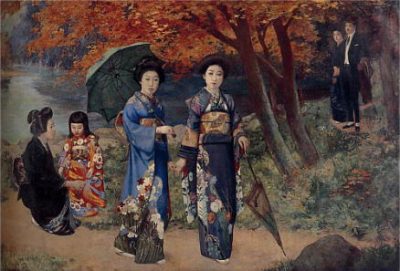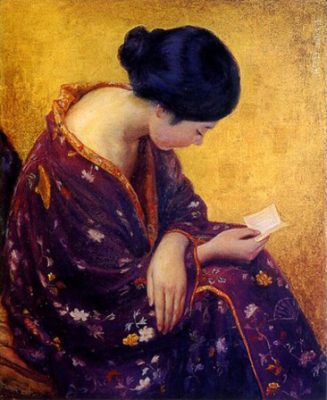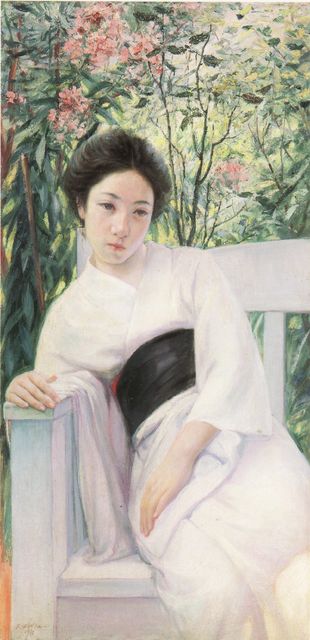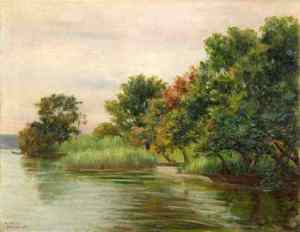Art of Japan in a changing environment: Paris and Saburosuke Okada
Lee Jay Walker
Modern Tokyo Times

Saburosuke Okada (1869-1939) was born one year after the Meiji Restoration of 1868 and he would witness many changes throughout his life. This applies to the Meiji Era, the Taisho Era, and the early part of the Showa period of history. Throughout these dramatic years, Japan went through many modernization processes and for artists, a new world would open up. Therefore, Saburosuke Okada seized the moment and ventured abroad in order to further his artistic horizons.
Ironically, while countless modernization processes engulfed Japan, the old world of Paris in France still shone brightly within the art world internationally. Not surprisingly, with new freedoms becoming a reality from the Meiji Era onwards, then Paris became a beacon for many Japanese artists.

In the early period of the development of Saburosuke Okada the school of Yukihiko Soyama in 1887 – and studying under Keiichiro Kume in the early 1890s – enhanced his early talents. Indeed, the blessing of studying under Keiichiro Kume meant that he was introduced to Seiki Kuroda. This early enrichment of his art stayed with Saburosuke Okada for the rest of his life.
In another article, I state “The Japanese Ministry of Education sent Saburosuke Okada on a mission to France which was the hotbed of the art world in this period of history. He joined other Japanese artists in Paris… In time, Saburosuke Okada studied Western oil painting under Raphael Collin and he would also study Western printmaking. On his return to Japan in 1902, it was clear that Paris and been extremely beneficial despite complex cultural and linguistic factors. Therefore, the world of Japan and the power of Paris played a powerful dual role in this period of his life.”

The year 1912 was very momentous because Saburosuke Okada and the esteemed Takeji Fujishima founded the Hongo Institute of Painting. This laid the foundation for both artists to influence many future Japanese artists. Significantly, Raphael Collin remained extremely powerful in the art of Saburosuke Okada. Therefore, the world of Paris was still flowing throughout his artistic soul.
On the website of Artelino, a rich source for Japanese art, it says, “Back in Japan Okada resumed teaching at the Tokyo School of fine Arts. He worked in Western oil painting and in metal plate print making techniques like etching. In 1923 he contributed a woodblock print – famous and coveted by collectors – the Heroine Osan to the Complete Collection of Chikamatsu.”

Artelino continues, “In 1931 Okada Saburosuke founded the Nihon Hanga Kyokai – Japan Print Cooperative Society – and became its first chairman. Yamamoto Kanae, the grandfather of Sosaku Hanga, became vice-president. Okada Saburosuke had convinced the members of the Yofu Hangakai (Western Style Print Society) and the Sosaku Hanga Kyokai to dissolve their organizations and unite in the new Nihon Hanga Kyokai.”
Overall, Paris shone brightly within the soul of Saburosuke Okada and the same applies to people who influenced him during his informative years. In 1937 he was rewarded for his service to Japan because he received the Order for Cultural Merits.
http://www.artelino.com/articles/saburosuke_okada.asp

Modern Tokyo News is part of the Modern Tokyo Times group
DONATIONS to SUPPORT MODERN TOKYO TIMES – please pay PayPal and DONATE to sawakoart@gmail.com
http://moderntokyotimes.com Modern Tokyo Times – International News and Japan News
http://sawakoart.com – Sawako Utsumi personal website and Modern Tokyo Times artist
https://moderntokyonews.com Modern Tokyo News – Tokyo News and International News
http://global-security-news.com Global Security News – Geopolitics and Terrorism
PLEASE JOIN ON TWITTER
https://twitter.com/MTT_News Modern Tokyo Times
PLEASE JOIN ON FACEBOOK